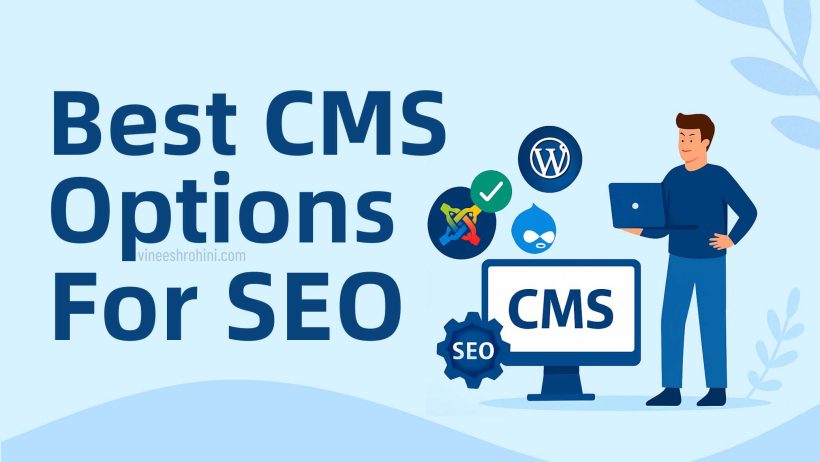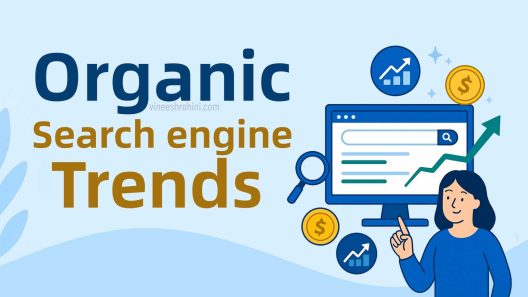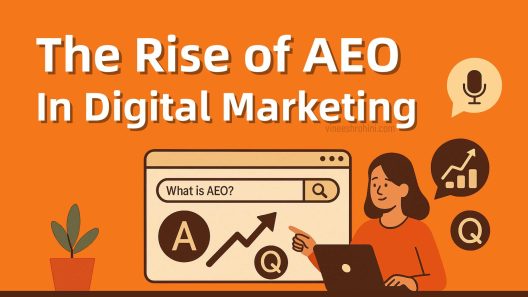CMS Options for SEO : In the digital era, where online visibility can make or break a business, the importance of SEO-friendly CMS platforms cannot be overstated. A CMS, or Content Management System, is the backbone of your website. It determines how easily you can create, manage, and optimize your content for search engines. In 2025, with search engine algorithms becoming smarter and competition fiercer, choosing the right CMS for SEO is no longer just about ease of use — it’s about having advanced tools, flexibility, and speed to stay ahead. Whether you are building a blog, an e-commerce store, or a corporate site, the CMS you choose can directly influence your search rankings, user experience, and ultimately your revenue.
Table of Contents
This detailed guide will take you through the top 10 best CMS platforms for SEO in 2025, their features, pros and cons, and why they stand out in the SEO landscape.
Why CMS Choice Matters for SEO

Search Engine Optimization is not just about keywords and backlinks anymore. G, Bing, and other search engines analyze hundreds of ranking factors, many of which are tied directly to your CMS capabilities. A good CMS ensures:
- Fast loading speed for better Core Web Vitals
- Clean, SEO-friendly URL structures
- Easy integration with SEO plugins and tools
- Mobile responsiveness for a better user experience
- Structured data support for rich snippets
- Strong security to maintain site trustworthiness
Without an SEO-friendly CMS, even the best content can struggle to rank. The right CMS provides the foundation for implementing all on-page and technical SEO strategies effectively.
Top 10 Best CMS Options for SEO in 2025

1. WordPress.org
Overview:
WordPress powers over 40% of all websites worldwide and remains the most popular CMS for SEO. As an open-source platform, it offers endless customization possibilities with thousands of themes and plugins.
SEO Features:
- Plugins like Yoast SEO and Rank Math for complete on-page optimization
- Customizable permalinks for clean URLs
- Mobile-friendly themes
- Fast-loading frameworks like GeneratePress and Astra
- Easy integration with G Analytics and Search Console
Pros:
- Extremely flexible and customizable
- Massive community support
- Regular updates for security and performance
Cons:
- Requires hosting and some technical setup
- Too many plugins can slow down performance if not managed properly
Best For: Bloggers, small businesses, and large websites looking for full control over SEO.
2. Shopify
Overview:
Shopify is a leading e-commerce CMS that comes with built-in SEO-friendly features, making it a great choice for online store owners.
SEO Features:
- Automatic creation of XML sitemaps
- Clean code structure for fast loading
- Customizable meta titles and descriptions
- Mobile-responsive themes
- Integration with SEO tools and apps like Plug in SEO
Also Read : What is Semantic SEO and Why It Matters
Pros:
- Excellent uptime and security
- Easy for beginners to set up and use
- Great for scaling e-commerce businesses
Cons:
- Limited flexibility compared to open-source platforms
- Some advanced SEO features require paid apps
Best For: E-commerce stores focused on SEO-driven sales.
3. Wix
Overview:
Wix has made significant improvements in its SEO capabilities over the years, offering a simple drag-and-drop interface with strong optimization features.
SEO Features:
- Built-in SEO Wiz tool for beginners
- Automatic mobile optimization
- Easy meta tag customization
- Structured data implementation
- HTTPS secured by default
Pros:
- Beginner-friendly with minimal setup
- Integrated hosting and security
- Fast page load times
Cons:
- Less flexibility for advanced SEO customization
- Template switching limitations
Best For: Small businesses, portfolios, and startups wanting a simple SEO-ready site.
4. Joomla
Overview:
Joomla is an open-source CMS that combines flexibility with powerful built-in SEO features, making it a great alternative to WordPress for more complex websites.
SEO Features:
- Customizable meta tags for each page
- Search-friendly URLs without extra plugins
- Strong multilingual SEO support
- Built-in caching for better performance
Pros:
- Highly customizable
- Great for large, content-rich websites
- Robust community support
Cons:
- Steeper learning curve than WordPress
- Requires more technical knowledge
Best For: Complex websites and multilingual projects.
5. Drupal
Overview:
Drupal is known for its robust security and scalability, making it ideal for enterprise-level websites.
SEO Features:
- Clean and semantic code
- Built-in caching and performance optimization
- Multilingual SEO capabilities
- Strong taxonomy system for content organization
Pros:
- Extremely secure
- Highly customizable for developers
- Great for large-scale projects
Cons:
- Not beginner-friendly
- Development costs can be higher
Best For: Large corporations, government websites, and institutions.
6. Magento (Adobe Commerce)
Overview:
Magento is a powerful e-commerce CMS built for scalability and advanced customization.
SEO Features:
- URL customization
- Product and category meta optimization
- Rich snippets for products
- Mobile-friendly responsive design
Pros:
- Highly flexible and scalable
- Rich e-commerce functionality
- Strong developer community
Cons:
- Requires technical expertise
- Hosting can be expensive
Best For: Large e-commerce businesses.
7. HubSpot CMS
Overview:
HubSpot CMS is a marketing-focused platform that integrates SEO with CRM and content marketing tools.
SEO Features:
- Built-in SEO recommendations
- Responsive themes
- A/B testing capabilities
- Strong analytics and tracking
Pros:
- All-in-one marketing solution
- Great integration with HubSpot’s CRM
- Easy for non-technical marketers
Cons:
- Costlier than many other CMS options
- Limited customization compared to open-source CMSs
Best For: Businesses focused on inbound marketing.
8. Squarespace
Overview:
Squarespace is popular for its sleek design templates and ease of use.
SEO Features:
- Mobile-responsive templates
- Automatic image optimization
- Built-in SSL
- Meta tag customization
Pros:
- Simple drag-and-drop interface
- Secure and reliable hosting
- Great design flexibility for creatives
Cons:
- Limited advanced SEO features
- Not ideal for large, complex sites
Best For: Creatives, portfolios, and small businesses.
9. Ghost
Overview:
Ghost is a CMS designed for publishers and bloggers, focusing on speed and simplicity.
SEO Features:
- Clean, fast-loading themes
- Built-in SEO settings
- Mobile-friendly
- AMP support for faster mobile pages
Pros:
- Minimalist and fast
- Excellent for blogging
- Easy integration with newsletters
Cons:
- Limited e-commerce capabilities
- Smaller plugin ecosystem
Best For: Professional bloggers and publishers.
10. Webflow
Overview:
Webflow offers a design-first CMS with SEO customization capabilities, ideal for creative professionals.
SEO Features:
- Custom meta tags and open graph settings
- Automatic sitemap generation
- Mobile responsiveness
- Clean code for faster load times
Pros:
- No-code design flexibility
- Visual editor with full control
- Great for unique designs
Cons:
- Learning curve for beginners
- Higher pricing for advanced features
Best For: Designers and agencies needing creative freedom with SEO.
How to Choose the Best CMS for SEO

When deciding on the best CMS, consider:
- Your website type (blog, e-commerce, portfolio, corporate)
- Your technical expertise
- Integration with SEO tools
- Performance, speed, and mobile responsiveness
- Cost and scalability
Buy Now : SEO Mastery Detailed Course
SEO Trends in CMS for 2025
- AI-powered SEO recommendations within CMS dashboards
- Core Web Vitals as a priority in template design
- Voice search optimization built into CMS platforms
- Headless CMS adoption for faster, more dynamic websites
- Integration with schema markup generators
Conclusion
Your CMS is more than just a content management tool — it’s a powerful driver of your SEO success. Choosing the right CMS in 2025 means balancing usability, customization, and built-in SEO capabilities. While WordPress remains the most versatile choice for many, platforms like Shopify, HubSpot, and Webflow are excellent for specific use cases. Ultimately, the best CMS for SEO is one that aligns with your business goals, technical comfort level, and growth plans.
Buy Now : SEO Mastery Detailed Course
Disclaimer : The views expressed in this article are based on current SEO trends and CMS capabilities as of 2025. The author does not guarantee specific search engine ranking results from using any particular CMS.
Keywords : CMS Options for SEO – CMS Options for SEO now – CMS Options for SEO in 2025








